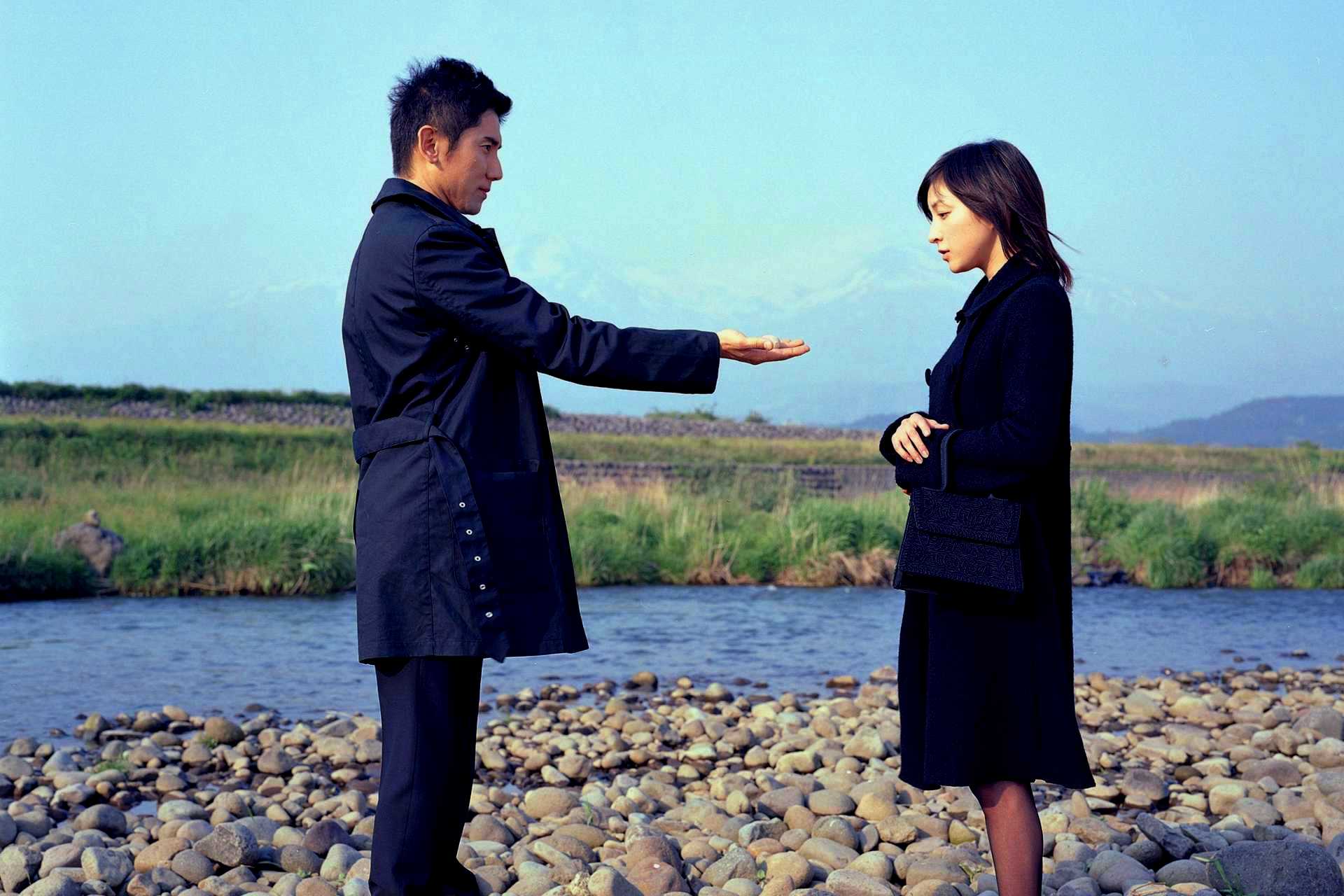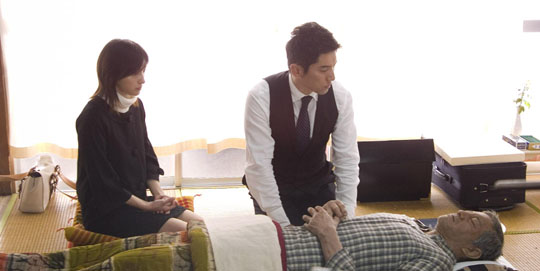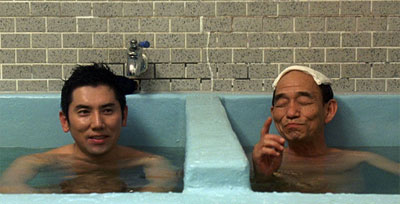
Departures is a gentle, beautiful and enriching film experience that takes itself on storywise as an elegy for the dead but in some miraculous way, reaching to a higher epiphany, makes you reexamine the spiritual connections in your own life. This Japanese film adopts the themes in awakening enlightenment and following your life’s calling. Yet here is a film that gives you more than just a story. Once in awhile a film comes along that places you in such deep absorption that you arrive at cooperative meditation and at a state of healing.
Opening with a mournful funeral scene, Daigo Kobayashi (Masahiro Motoki) and his boss Sasaki (Tsutomu Yamazaki) perform a funeral presiding before the family of the deceased. Daigo is new at being a “nokanshi,” a man who performs ceremonial washing and make-up art of corpses before their burial. He is still under training at this ceremony but feigns the certain kind of majesty that the ceremony requires. Just when you think the ceremony scene couldn’t be more doleful a comic situation arrives: the transgender corpse prompts Daigo and Sasaki to inquire the family as to what kind of make-up job, male or female, needs to be implemented.
This film centers on the drama of Daigo on whether he can find complacency in a life riddled by uncertainties and disappointments. Encoffiner is not the preferred vocation of his choice. After that peculiarly funny opening, we go back to months earlier to observe that Daigo is a talented cellist performing in a Tokyo classical music orchestra. Shortage of income requires the orchestra to disband completely which leaves Daigo unemployed. What a sad notion that classical music has reached such a low in popularity that the arts are becoming extinct. But that’s another story.
Despondent over his failed career, Daigo moves himself and his wife Mika (Ryoko Hirosue) back to small town of Yamagata where he grew up taking over his late mother’s house. With a shortage of available jobs, Daigo jumps at an opening at an unnamed company offering few hours, lots of money. Daigo agreeably accepts the job as encoffiner before he knows what it actually means and then is appalled to learn the specifics. He has a fear of blood and dead bodies in general but he knows it’s time in his young marriage to suck it up. So at first it’s an interval job.
Performing his job with ignominious detachment, Daigo trudges on solely for the high earnings he is able to bring home to his wife. But the job, for a young man like himself, has negative social connotations. A friend tells him to “Get a real job before someone finds out!” When his wife finds out she is ashamed for him. This loving and tender marriage suddenly is filled with unease.
 It’s silly for Daigo to be ashamed, really, but one of the lessons the film imparts is that there is a wisdom achieved in finding pride in what you do professionally. Honor is found in how you practice your daily living, and somehow that comes to our hero without there being any fluctuation, even when his wife’s love is fickle. Once devoted, no fear of blood (nor failure) can keep Daigo from rising above his assistant rank to become a full nokanshi master.
It’s silly for Daigo to be ashamed, really, but one of the lessons the film imparts is that there is a wisdom achieved in finding pride in what you do professionally. Honor is found in how you practice your daily living, and somehow that comes to our hero without there being any fluctuation, even when his wife’s love is fickle. Once devoted, no fear of blood (nor failure) can keep Daigo from rising above his assistant rank to become a full nokanshi master.
In a film that considers death there is of course going to be several funeral situations, and this film even gets a passage of time montage of such services. The results are mixed from gloomy funerals to commemorative-style funerals (one moment with an adolescent granddaughter bestowing her thanks upon the deceased is one of the most touching scenes that has ever stuck with me). Families honor the dead differently, but no matter what, Daigo performs his duties with equal esteem. And this day job doesn’t mean he has to give up the cello either.
Lessons aside, one of the beauties of the movie is getting immersed into this small town life of Yamagata. Things move much slower than in city life. The people are more openhearted and generous, more entrenched into their neighbors’ wants and longings, more tranquil with the simple pleasures around them. If you live in a metropolitan city (and if you see this in a theater near you than you probably do), this film makes you see the possibilities of what other kind of life choices are out there – simple village life is sometimes the rewarding path.

“Departures” was a wise choice to win the 2009 Academy Award for Best Foreign Film.
130 Minutes. Rated PG-13.
FOREIGN / LIFE LESSONS / SPRING AWAKENING
Film Cousins: “Late Spring” (1949, Japan); “Tokyo Story” (1953, Japan); “Floating Weeds” (1959, Japan); “After Life” (1998, Japan).





